英综book3Unit 6 A Day’s Wait
- 格式:doc
- 大小:77.50 KB
- 文档页数:9
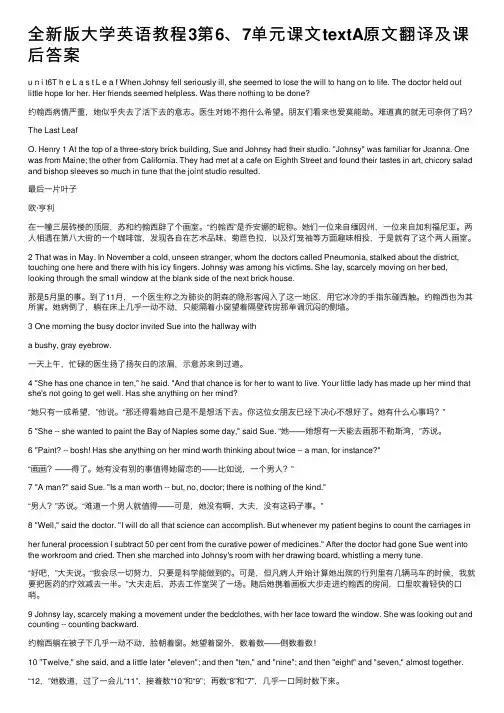
全新版⼤学英语教程3第6、7单元课⽂textA原⽂翻译及课后答案u n i t6T h e L a s t L e a f When Johnsy fell seriously ill, she seemed to lose the will to hang on to life. The doctor held out little hope for her. Her friends seemed helpless. Was there nothing to be done?约翰西病情严重,她似乎失去了活下去的意志。
医⽣对她不抱什么希望。
朋友们看来也爱莫能助。
难道真的就⽆可奈何了吗?The Last LeafO. Henry 1 At the top of a three-story brick building, Sue and Johnsy had their studio. "Johnsy" was familiar for Joanna. One was from Maine; the other from California. They had met at a cafe on Eighth Street and found their tastes in art, chicory salad and bishop sleeves so much in tune that the joint studio resulted.最后⼀⽚叶⼦欧·亨利在⼀幢三层砖楼的顶层,苏和约翰西辟了个画室。
“约翰西”是乔安娜的昵称。
她们⼀位来⾃缅因州,⼀位来⾃加利福尼亚。
两⼈相遇在第⼋⼤街的⼀个咖啡馆,发现各⾃在艺术品味、菊苣⾊拉,以及灯笼袖等⽅⾯趣味相投,于是就有了这个两⼈画室。
2 That was in May. In November a cold, unseen stranger, whom the doctors called Pneumonia, stalked about the district, touching one here and there with his icy fingers. Johnsy was among his victims. She lay, scarcely moving on her bed, looking through the small window at the blank side of the next brick house.那是5⽉⾥的事。
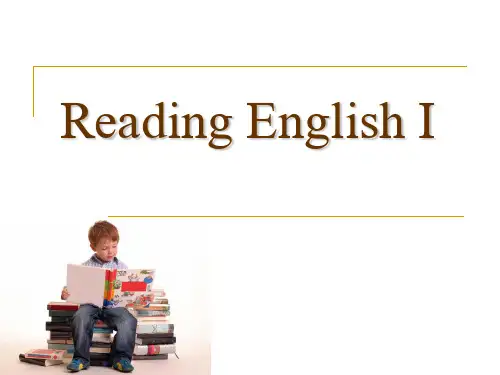
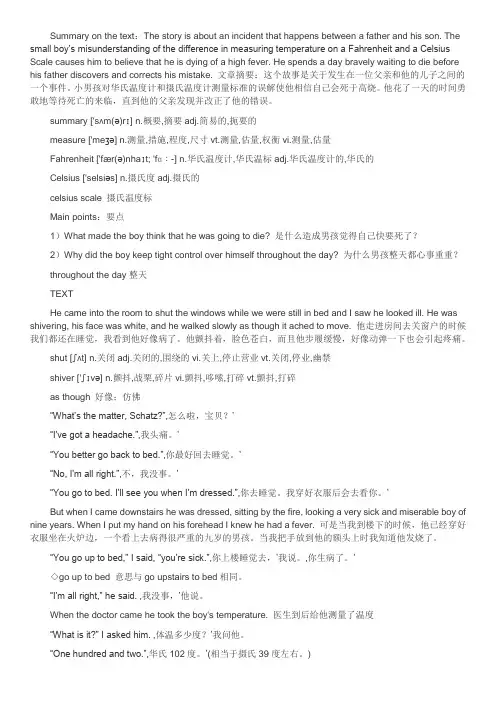
Summary on the text:The story is about an incident that happens between a father and his son. The small boy’s misunderstanding of the difference in measuring temperature on a Fahrenheit and a Celsius Scale causes him to believe that he is dying of a high fever. He spends a day bravely waiting to die before his father discovers and corrects his mistake. 文章摘要:这个故事是关于发生在一位父亲和他的儿子之间的一个事件。
小男孩对华氏温度计和摄氏温度计测量标准的误解使他相信自己会死于高烧。
他花了一天的时间勇敢地等待死亡的来临,直到他的父亲发现并改正了他的错误。
summary ['sʌm(ə)rɪ] n.概要,摘要adj.简易的,扼要的measure ['meʒə] n.测量,措施,程度,尺寸vt.测量,估量,权衡vi.测量,估量Fahrenheit ['fær(ə)nhaɪt; 'fɑː-] n.华氏温度计,华氏温标adj.华氏温度计的,华氏的Celsius ['selsiəs] n.摄氏度adj.摄氏的celsius scale 摄氏温度标Main points:要点1)What made the boy think that he was going to die? 是什么造成男孩觉得自己快要死了?2)Why did the boy keep tight control over himself throughout the day? 为什么男孩整天都心事重重?throughout the day整天TEXTHe came into the room to shut the windows while we were still in bed and I saw he looked ill. He was shivering, his face was white, and he walked slowly as though it ached to move. 他走进房间去关窗户的时候我们都还在睡觉,我看到他好像病了。
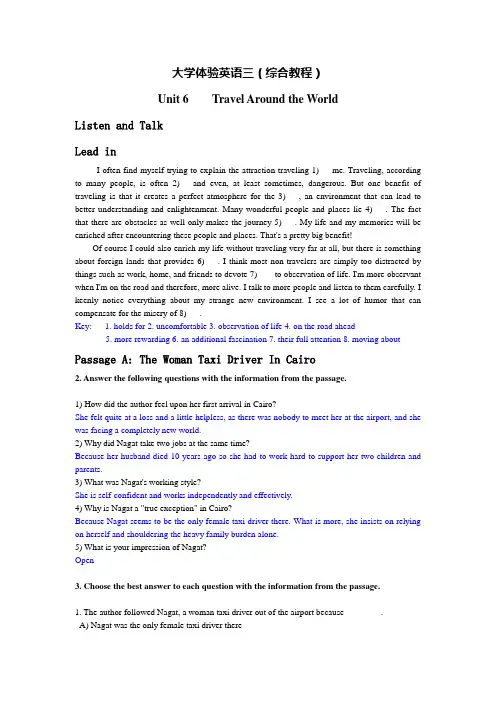
大学体验英语三(综合教程)Unit 6Travel Around the WorldListen and TalkLead inI often find myself trying to explain the attraction traveling 1) me. Traveling, according to many people, is often 2) and even, at least sometimes, dangerous. But one benefit of traveling is that it creates a perfect atmosphere for the 3) , an environment that can lead to better understanding and enlightenment. Many wonderful people and places lie 4) . The fact that there are obstacles as well only makes the journey 5) . My life and my memories will be enriched after encountering these people and places. That's a pretty big benefit!Of course I could also enrich my life without traveling very far at all, but there is something about foreign lands that provides 6) . I think most non-travelers are simply too distracted by things such as work, home, and friends to devote 7) to observation of life. I'm more observant when I'm on the road and therefore, more alive. I talk to more people and listen to them carefully. I keenly notice everything about my strange new environment. I see a lot of humor that can compensate for the misery of 8) .Key: 1. holds for 2. uncomfortable 3. observation of life 4. on the road ahead5. more rewarding6. an additional fascination7. their full attention8. moving about Passage A: The Woman Taxi Driver In Cairo2. Answer the following questions with the information from the passage.1) How did the author feel upon her first arrival in Cairo?She felt quite at a loss and a little helpless, as there was nobody to meet her at the airport, and she was facing a completely new world.2) Why did Nagat take two jobs at the same time?Because her husband died 10 years ago so she had to work hard to support her two children and parents.3) What was Nagat's working style?She is self-confident and works independently and effectively.4) Why is Nagat a "true exception" in Cairo?Because Nagat seems to be the only female taxi driver there. What is more, she insists on relying on herself and shouldering the heavy family burden alone.5) What is your impression of Nagat?Open3. Choose the best answer to each question with the information from the passage.1. The author followed Nagat, a woman taxi driver out of the airport because ________.A) Nagat was the only female taxi driver thereB) Nagat forced her to do soC) she instinctively felt she should trust NagatD) she had no other choice but to go with Nagat2. The author enjoyed Nagat's company for all the following reasons except that ________.A) she had a very good sense of directionsB) she was always punctualC) she was able to understand human natureD) she asked for low fares3. It can be inferred from the passage that ________.A) it was difficult for the author to hire a taxi in CairoB) it was unusual for a woman to work as a taxi driver in CairoC) Nagat often got offers of help from her male colleaguesD) Nagat also worked as an office secretary4. In the author's eyes, Nagat was ________.A) capable and independentB) more like a man than a womanC) competitive and aggressiveD) attractive and appealing5. In the passage, the author tries to tell us ________.A) her impression of Islamic architectureB) her impression of CairoC) her appreciation of the dignity of a womanD) her friendship with a woman taxi driverAnwser: 1.C, 2.D, 3.B, 4.A, 5.C4.Fill in each of the blanks with an appropriate word.Arriving alone in a new city late at night can be a difficult e____and even more so if it is in a foreign country with a foreign c___. Here the writer, herself a woman, remembers her luck in meeting Nagat, one of the few w___taxi drivers in Cairo. During her s___in the city, Nagat became her driver and guide taking her to visit many of the i___sights such as mosques, museums and the p___Along the way the writer was deeply i___by Nagat’s friendliness, determ ination, effectiveness and i___Anwser: 1.experience 2.culture 3.women 4.stay 5.impressive6.pyramids7.impressed8.independence5. S tudy the meanings of the prefixes listed in the table, and then fill in each blank in the sentences that follow with the word given in brackets by adding an appropriate prefix to it.Prefix Meaning Examplecounter- opposing, corresponding counteract, counterpartinter- between, among interconnected, interrelated, internationalout- outside beyond, more than outskirts outlive, outgrowover- too much overcook, overactunder- too little underpay, underestimate1.An country does not have modern industries and usually has a low standard of living. (developed)2.The southern city soon became as waves of people rushed to it from all parts of the country. (populated)3.He managed to his fear of the darkness when he walked in the deserted street late at night. (grow)4.Energy, population and environment are issues in rural development in Southeast Asia. (related)5. V irtually every character in the movie has a real life . (part)Anwser: 1.underdeveloped 2.overpopulated 3.outgrow 4.interrelated 5.counterpart 6. Fill in the blanks with the words given below. Change the form where necessary.approach core counterpart economy efficientexception invite relief punctually vague1. The mayor is scheduled to meet his American ___ during his 7-day visit to San Francisco.2. Mr. Wilson is quite satisfied with his new secretary because she's much more ___ than the former one.3. I felt great ____ when I heard I had passed the examination.4. The regulations are so ____ that they lead to misinterpretation.5. Chinese and mathematics have always been the ____ subjects in primary and secondary schools in China.6. Y ou are expected to get to the interview ____ or a few minutes early.7. Getting tired of her partner's all-talk-no-action ___ , she decided to take the action all by herself.8. For the purpose of ____ , Mary decided to take lunch box to work every day.9. Y ou could not be exempted from the punishment because there can be no ____ to the rule.10. Strife at home would ____ dangers from abroad.Anwser: 1. counterpart 2. efficient 3. relief 4. vague 5. core6. punctually7. approach8. economy9. exception 10. invite7. Complete the following sentences with phrases or expressions from the passage. Make changes where necessary.1. We hope the special loan from the bank will ___ our company ____ the crisis.2. It is believed that the car the police found at the parking lot of the airport terminal ___ the gunman.3. He founded the company five years ago and has been managing the business ___ .4. The five candidates will speak ___ to introduce themselves to the voters.5. At the wedding party, guests ___ with cocktails in hand, talking and laughing.Anwser: 1. pull … through 2. belongs to 3. ever since 4. in turn 5. milled about8. T ranslate the following sentences into English.1. 他悲叹一声,对我们说他年轻时也曾风光一时。
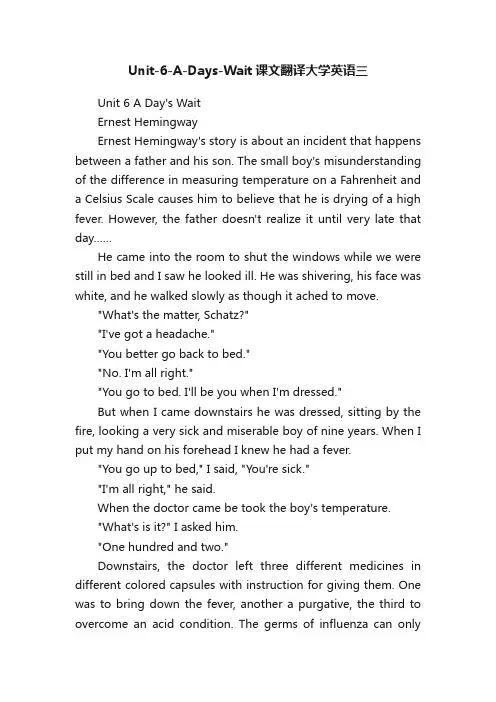
Unit-6-A-Days-Wait课文翻译大学英语三Unit 6 A Day's WaitErnest HemingwayErnest Hemingway's story is about an incident that happens between a father and his son. The small boy's misunderstanding of the difference in measuring temperature on a Fahrenheit and a Celsius Scale causes him to believe that he is drying of a high fever. However, the father doesn't realize it until very late that day……He came into the room to shut the windows while we were still in bed and I saw he looked ill. He was shivering, his face was white, and he walked slowly as though it ached to move."What's the matter, Schatz?""I've got a headache.""You better go back to bed.""No. I'm all right.""You go to bed. I'll be you when I'm dressed."But when I came downstairs he was dressed, sitting by the fire, looking a very sick and miserable boy of nine years. When I put my hand on his forehead I knew he had a fever."You go up to bed," I said, "You're sick.""I'm all right," he said.When the doctor came be took the boy's temperature."What's is it?" I asked him."One hundred and two."Downstairs, the doctor left three different medicines in different colored capsules with instruction for giving them. One was to bring down the fever, another a purgative, the third to overcome an acid condition. The germs of influenza can onlyexist in an acid condition, he explained. He seemed to know all about influenza and said there was nothing to worry about if the fever did not go above one hundred and four degrees. This was a light epidemic of flu and there was no danger if you avoided pneumonia.Back in the room I wrote the boy's temperature down and made a note of the time to give the various capsules."Do you want me to read to you?""All right. If you want to, " said the boy. His face was very white and there were dark areas under his eyes. He lay still in the bed and seemed very detached from what was going on.I read aloud from Howard Pyle's Book of pirates; but I could see he was not following what I was reading."How do you feel, Schatz?" I asked him."Just the same, so far," he said.I sat at the foot of the bed and read to myself while I waited for it to be time to give another capsule. It would have been natural for him to go to sleep, but when I looked up he was looking at the foot of the bed, looking very strangely."Why don't you try to sleep? I'll make you up for the medicine.""I'd rather stay awake."After a while he said to me, "You don't have to stay in here with me, Papa, if it bothers you.""It doesn't bother me.""No, I mean you don't have to stay if it's going to bother you."I though perhaps he was a little lightheaded and after giving him the prescribed capsules at eleven o'clock I went out for a while. It was a bright, cold day, the ground covered with a sleetthat had frozen so that it seemed as if all the bare trees, the bushes, the cut brush and all the grass and the bare ground had been varnished with ice, I took the young Irish setter for a walk up the road and along a frozen creek, but it was difficult to stand or walk on the glassy surface and the red dog slipped and slithered and I fell twice, hard, once dropping my gun and having it slide away over the ice.We flushed a covey of quail under a high clay bank with overhanging brush and I killed two as they went out of sight over the top of the blank. Some of the covey lit in trees, but most of them scattered into brush piles and it was necessary to jump on the ice-coated mounds of brush several times before they would flush. Coming out while you were poised unsteadily on the icy, springy brush they made difficult shooting and I killed two, missed five, and started back pleased to have found a covey close to the house and happy there were so many left to find on another day.At the house they said the boy had refused to let anyone come into the room."You can't come in," he said. "You mustn't get what I have."I went up to him and found him in exactly the position I had left him, white-faced, but with the tops of his cheeks flushed by the fever, staring still, as he had stared, at the foot of the bed.I took his temperature."What is it?""Something like a hundred," I said. It was one hundred and two and four tenths."It was a hundred and two," he said."Who said so?""The doctor.""Your temperature is all right," I said. "It's nothing to worry about.""I don't worry," he said, "but I can't keep from thinking.""Don't think," I said. "Just take it easy.""I'm taking it easy," he said and looked straight ahead, He was evidently holding tight onto himself about something."Take this with water.""Do you think it will do any good?""Of course it will."I sat down and opened the Pirate book and commenced to read, but I could see he was not following, so I stooped."About what time do you think I'm going to die?" he asked."What?""About how long will it be before I die?""You aren't going die. What's the matter with you? ""Oh, yes, I am, I heard him say a hundred and two.""People don't die with a fever of one hundred and two. That's a silly way to talk.""I know they do. At school in France the boys told me you can't live with forty-four degrees. I've got a hundred and two."He had been waiting to die all day, ever since nine o'clock in the morning."You poor Schatz," I said. "Poor old Schatz. It's like miles and kilometers. You aren't going to die. That's different thermometer. On that thermometer thirty-seven is normal. On this kind it's ninety-eight.""Are you sure?""Absolutely," I said, "It's like miles and kilometers. You know, like how many kilometers we make when we do seventy miles in the car?""Oh," he said.But his gaze at the foot of the bed relaxed slowly. The hold over himself relaxed too, finally, and the next day it was very slack and he cried very easily at little things that were of no importance.一天的等待我们还没起床时,走进房间关窗,我注意到他看起来病了。
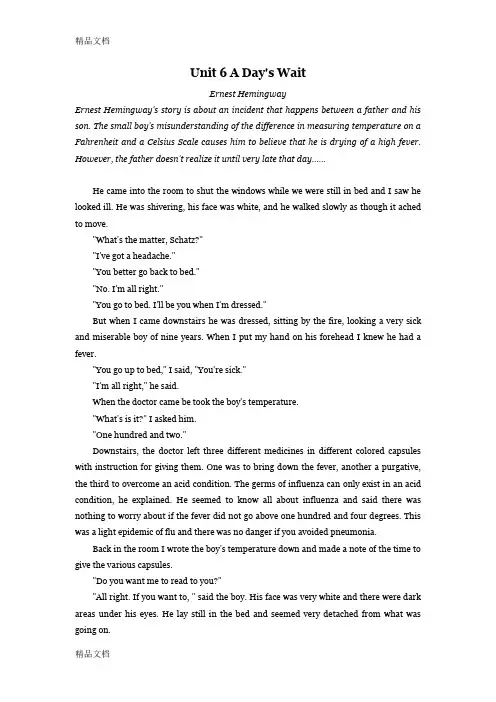
Unit 6 A Day's WaitErnest HemingwayErnest Hemingway's story is about an incident that happens between a father and his son. The small boy's misunderstanding of the difference in measuring temperature on a Fahrenheit and a Celsius Scale causes him to believe that he is drying of a high fever. However, the father doesn't realize it until very late that day……He came into the room to shut the windows while we were still in bed and I saw he looked ill. He was shivering, his face was white, and he walked slowly as though it ached to move."What's the matter, Schatz?""I've got a headache.""You better go back to bed.""No. I'm all right.""You go to bed. I'll be you when I'm dressed."But when I came downstairs he was dressed, sitting by the fire, looking a very sick and miserable boy of nine years. When I put my hand on his forehead I knew he had a fever."You go up to bed," I said, "You're sick.""I'm all right," he said.When the doctor came be took the boy's temperature."What's is it?" I asked him."One hundred and two."Downstairs, the doctor left three different medicines in different colored capsules with instruction for giving them. One was to bring down the fever, another a purgative, the third to overcome an acid condition. The germs of influenza can only exist in an acid condition, he explained. He seemed to know all about influenza and said there was nothing to worry about if the fever did not go above one hundred and four degrees. This was a light epidemic of flu and there was no danger if you avoided pneumonia.Back in the room I wrote the boy's temperature down and made a note of the time to give the various capsules."Do you want me to read to you?""All right. If you want to, " said the boy. His face was very white and there were dark areas under his eyes. He lay still in the bed and seemed very detached from what was going on.I read aloud from Howard Pyle's Book of pirates; but I could see he was not following what I was reading."How do you feel, Schatz?" I asked him."Just the same, so far," he said.I sat at the foot of the bed and read to myself while I waited for it to be time to give another capsule. It would have been natural for him to go to sleep, but when I looked up he was looking at the foot of the bed, looking very strangely."Why don't you try to sleep? I'll make you up for the medicine.""I'd rather stay awake."After a while he said to me, "You don't have to stay in here with me, Papa, if it bothers you.""It doesn't bother me.""No, I mean you don't have to stay if it's going to bother you."I though perhaps he was a little lightheaded and after giving him the prescribed capsules at eleven o'clock I went out for a while. It was a bright, cold day, the ground covered with a sleet that had frozen so that it seemed as if all the bare trees, the bushes, the cut brush and all the grass and the bare ground had been varnished with ice, I took the young Irish setter for a walk up the road and along a frozen creek, but it was difficult to stand or walk on the glassy surface and the red dog slipped and slithered and I fell twice, hard, once dropping my gun and having it slide away over the ice.We flushed a covey of quail under a high clay bank with overhanging brush and I killed two as they went out of sight over the top of the blank. Some of the covey lit in trees, but most of them scattered into brush piles and it was necessary to jump on the ice-coated mounds of brush several times before they would flush. Coming out while you were poised unsteadily on the icy, springy brush they made difficult shooting and I killed two, missed five, and started back pleased to have found a covey close to the house and happy there were so many left to find on another day.At the house they said the boy had refused to let anyone come into the room."You can't come in," he said. "You mustn't get what I have."I went up to him and found him in exactly the position I had left him, white-faced, but with the tops of his cheeks flushed by the fever, staring still, as he had stared, at the foot of the bed.I took his temperature."What is it?""Something like a hundred," I said. It was one hundred and two and four tenths."It was a hundred and two," he said."Who said so?""The doctor.""Your temperature is all right," I said. "It's nothing to worry about.""I don't worry," he said, "but I can't keep from thinking.""Don't think," I said. "Just take it easy.""I'm taking it easy," he said and looked straight ahead, He was evidently holding tight onto himself about something."Take this with water.""Do you think it will do any good?""Of course it will."I sat down and opened the Pirate book and commenced to read, but I could see he was not following, so I stooped."About what time do you think I'm going to die?" he asked."What?""About how long will it be before I die?""You aren't going die. What's the matter with you? ""Oh, yes, I am, I heard him say a hundred and two.""People don't die with a fever of one hundred and two. That's a silly way to talk.""I know they do. At school in France the boys told me you can't live with forty-four degrees. I've got a hundred and two."He had been waiting to die all day, ever since nine o'clock in the morning."You poor Schatz," I said. "Poor old Schatz. It's like miles and kilometers. You aren't going to die. That's different thermometer. On that thermometer thirty-seven is normal. On this kind it's ninety-eight.""Are you sure?""Absolutely," I said, "It's like miles and kilometers. You know, like how many kilometers we make when we do seventy miles in the car?""Oh," he said.But his gaze at the foot of the bed relaxed slowly. The hold over himself relaxed too, finally, and the next day it was very slack and he cried very easily at little things that were of no importance.一天的等待我们还没起床时,走进房间关窗,我注意到他看起来病了。
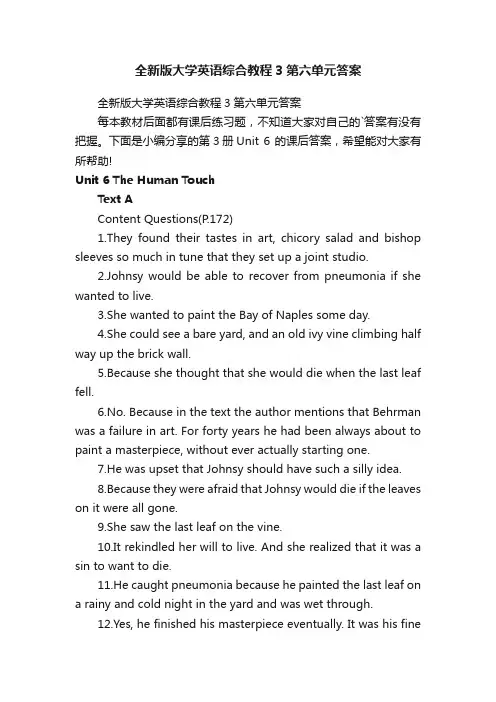
全新版大学英语综合教程3第六单元答案全新版大学英语综合教程3第六单元答案每本教材后面都有课后练习题,不知道大家对自己的`答案有没有把握。
下面是小编分享的第3册Unit 6 的课后答案,希望能对大家有所帮助!Unit 6 The Human TouchText AContent Questions(P.172)1.They found their tastes in art, chicory salad and bishop sleeves so much in tune that they set up a joint studio.2.Johnsy would be able to recover from pneumonia if she wanted to live.3.She wanted to paint the Bay of Naples some day.4.She could see a bare yard, and an old ivy vine climbing half way up the brick wall.5.Because she thought that she would die when the last leaf fell.6.No. Because in the text the author mentions that Behrman was a failure in art. For forty years he had been always about to paint a masterpiece, without ever actually starting one.7.He was upset that Johnsy should have such a silly idea.8.Because they were afraid that Johnsy would die if the leaves on it were all gone.9.She saw the last leaf on the vine.10.It rekindled her will to live. And she realized that it was a sin to want to die.11.He caught pneumonia because he painted the last leaf ona rainy and cold night in the yard and was wet through.12.Yes, he finished his masterpiece eventually. It was his finepainting of the last leaf, the painting that saved Johnsy.Text Organization (P.173)1. (P.173)1).She made up her mind to die when the last leaf fell.2).She decided not to give up her life.3).Behrman, a kind neighbor, who was aware of Johnsys state of mind, risked death to paint the last leaf and save her.4).Because it was so perfect the girls both mistook it for the real thing.2. (P.173)ScenesParagraphsCharactersEvents1Paras 1-2Sue, JohnsySues roommate Johnsy caught pneumonia.2Paras 3-8the doctor, SueThe doctor told Sue that Johnsy needed a strong will to live on.3Paras 9-17Johnsy, SueJohnsy decided that she would die when the 1 last ivy leaf fell.4Paras 18-2.1Behrman, SueSue told Behrman about Johnsys fancy.5Paras 22-33Sue, JohnsyAs Johnsy was encouraged by the last leaf that wouldnt give in to the weather, herwill to live returned.6Paras 34-37the doctor, Sue■The doctor told Sue that Johnsy would re?cover, but Behrman caught pneumonia him?self and his case was hopeless.7Paras 38-39Sue, JohnsySue told Johnsy that Behrman had performed a kind deed without any thought of self.Language Sense Enhancement (P.174)I. 1)curling 2) looking the part3)masterpiece 4) to excess5)For the rest 6) smelling strongly of7)fancy 8) light and fragile9)slight hold upon the world10) streamingLanguage Focus (P.176)Vocabulary(P.176)1. 1) masterpieces 2) fragile3) fancy 4) nonsense5) cling to 6)endure7) acute 8) whistle9) mock 10) subtracted11) Sin 12) flutter/fluttering2.(P.177)1) gave in/gave up2) figure out3) sized up 4) wiped out 5) pulling up 6) wear away7) sit up8) hear of / about3.(P. 178)1) Illnesses usually stand out in childhood memories.2)According to the bulletin, Albright College now offers a joint bachelors degree program in environmental studies together with Duke University.3)The new government is less oppressive, but violence still stalks the country.4)There is scarcely any surface water in the desert.5)The demand for change in the election law is so persistent that both houses have promised to consider it.4.(P. 178—179)1) It was dreary lying in the tent with nothing to read, so we built a camp fire. Soon the smellof steaks, bread and coffee mingled with that of fresh grassand earth. Other campers seemed to be doing the same. Here and there people were eating, drinking or dancing to their hearts content, if not to excess. What a merry night!2)Miss Florence, our music teacher, called to us to stop singing. I didnt realize why until Sally told me in a whisper: " You are not in tune with the group!"3)The angry wife poured a bucket of water over her drunken husband, who was immedi?ately wet through and stumbled backward: " You cant do without drinks? I wont hear of any excuses. You certainly dont need it to turn loose your tongue!"II.Words with Multiple Meanings (P. 179—180)1.He went to Paris on business last month.2.The train to Brussels goes at 2:25p.m.3.As soon as they arrived at the meadow, the shepherd let the sheep go.4.We went exploring together in the mountains. / We will go exploring together in the mountains.5.Lets go and have a drink in the bar.6.The store is going to close up soon.7.South Koreans went crazy when their soccer players beat the Spanish team in the quarter?finals.8.When Mother came out of the house, she found her children gone.age (P. 180)1.a little white wooden house2.long, curly red hair2.a large old round table3.a cheap Indian restaurant4.a huge cool chocolate ice-cream5.rapid technological advance6.a handsome young Chinese AmericanComprehensive ExercisesI. Cloze (P. 181)(A)1. in tune2.Scarcely3. in a whisper4.cling to5. merry6.sat up7. nonsense8.fancy9. sin10.masterpiece(B)1. mission2.involve3. jail4.not5. collect6.deliver7. beautiful8.vocation9. need10.smallII. Translation (P. 182)1. (P. 182)1).The red house stands out against the old trees that reach high up to the sky.2).The salary in/for my new jobis great, but for the rest, I’m not satisfied.3).The waters of the two streams mingle near our village.4).We should not mock at other people’s religious beliefs.5).The curtains of the room are not quite in tune with the style of the furniture.2. (P. 182)Here and there we see young artists who stand out from other people. They may be in worn out jeans all the year round, or walk barefoot / in bare feet even in winter, or drink to excess, or cling to the fancy of creating a masterpiece without actuallydoing any creative work. In fact, many of them act like this just to look the part, or to be "in tune with" other artists. They have forgotten that only through persistent effort can one achieve success.。
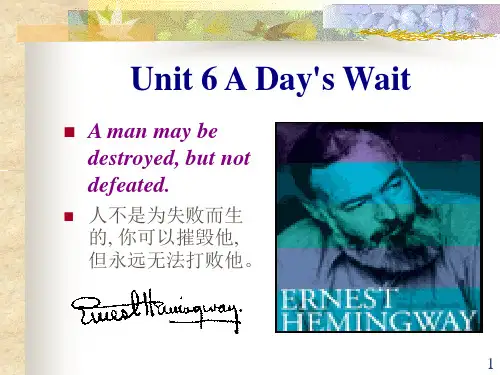
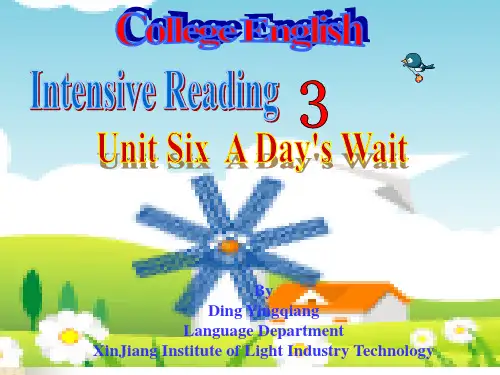
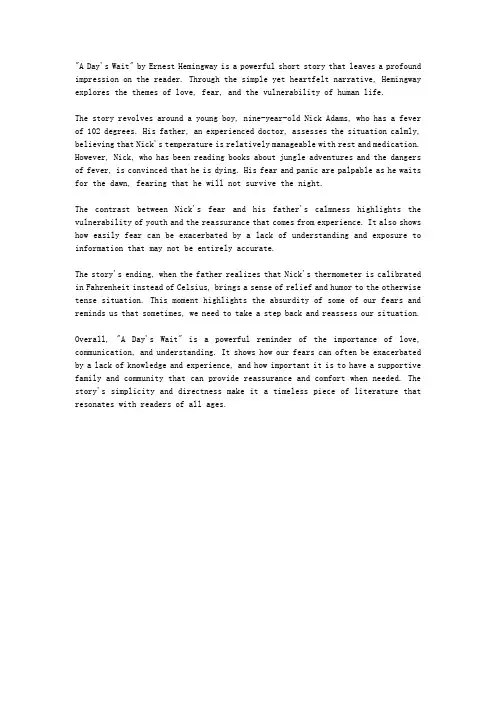
"A Day's Wait" by Ernest Hemingway is a powerful short story that leaves a profound impression on the reader. Through the simple yet heartfelt narrative, Hemingway explores the themes of love, fear, and the vulnerability of human life.The story revolves around a young boy, nine-year-old Nick Adams, who has a fever of 102 degrees. His father, an experienced doctor, assesses the situation calmly, believing that Nick's temperature is relatively manageable with rest and medication. However, Nick, who has been reading books about jungle adventures and the dangers of fever, is convinced that he is dying. His fear and panic are palpable as he waits for the dawn, fearing that he will not survive the night.The contrast between Nick's fear and his father's calmness highlights the vulnerability of youth and the reassurance that comes from experience. It also shows how easily fear can be exacerbated by a lack of understanding and exposure to information that may not be entirely accurate.The story's ending, when the father realizes that Nick's thermometer is calibrated in Fahrenheit instead of Celsius, brings a sense of relief and humor to the otherwise tense situation. This moment highlights the absurdity of some of our fears and reminds us that sometimes, we need to take a step back and reassess our situation.Overall, "A Day's Wait" is a powerful reminder of the importance of love, communication, and understanding. It shows how our fears can often be exacerbated by a lack of knowledge and experience, and how important it is to have a supportive family and community that can provide reassurance and comfort when needed. The story's simplicity and directness make it a timeless piece of literature that resonates with readers of all ages.。
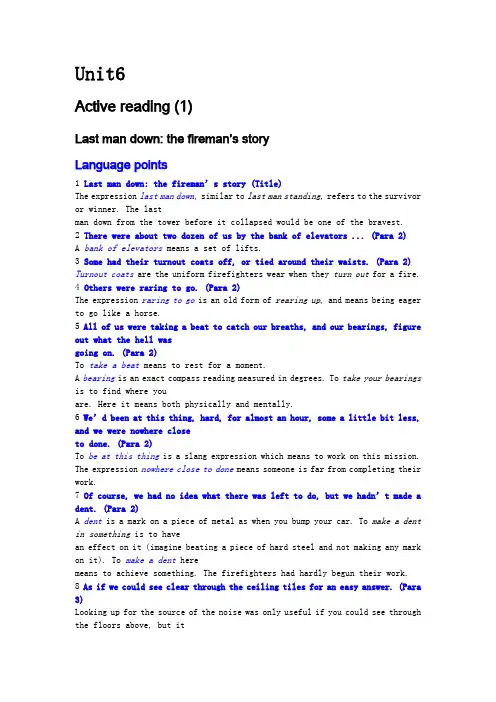
Unit6Active reading (1)Last man down: the fireman’s storyLanguage points1 Last man down: the fireman’s story (Title)The expression last man down, similar to last man standing, refers to the survivor or winner. The lastman down from the tower before it collapsed would be one of the bravest.2 There were about two dozen of us by the bank of elevators ... (Para 2)A bank of elevators means a set of lifts.3 Some had their turnout coats off, or tied around their waists. (Para 2) Turnout coats are the uniform firefighters wear when they turn out for a fire.4 Others were raring to go. (Para 2)The expression raring to go is an old form of rearing up, and means being eager to go like a horse.5 All of us were taking a beat to catch our breaths, and our bearings, figure out what the hell wasgoing on. (Para 2)To take a beat means to rest for a moment.A bearing is an exact compass reading measured in degrees. To take your bearings is to find where youare. Here it means both physically and mentally.6 We’d been at this thing, hard, for almost an hour, some a little bit less, and we were nowhere closeto done. (Para 2)To be at this thing is a slang expression which means to work on this mission. The expression nowhere close to done means someone is far from completing their work.7 Of course, we had no idea what there was left to do, but we hadn’t made a dent. (Para 2)A dent is a mark on a piece of metal as when you bump your car. To make a dent in something is to havean effect on it (imagine beating a piece of hard steel and not making any mark on it). To make a dent heremeans to achieve something. The firefighters had hardly begun their work.8 As if we could see clear through the ceiling tiles for an easy answer. (Para 3)Looking up for the source of the noise was only useful if you could see through the floors above, but itstill remained an instinctive reaction.9 The building was shaking like in an earthquake, like an amusement park thrill ride gone berserk …(Para 3)The word berserk was originally about ancient Viking warriors who worshipped a bear god (ber). Theywould go into a terrible rage or madness when fighting. It now means utterly and dangerously crazy.10 The way it coursed right through me. (Para 3)To course means to run or flow somewhere quickly. The noise and vibration have a strong physical effecton the writer.11 I thought about my wife and my kids, but only fleetingly and not in any kind of life-flashing-beforemy-eyes sort of way. (Para 4)Life flashing before my eyes is a claim made by someone who has near-death experiences, as in anaccident, of seeing a slow motion version of the most important events in their lives. Researchers say itmay be the reaction of the brain to trauma.Streets full of heroes Unit 619912 Or, “We’ll all meet at the big one.” (Para 4)After any fire, the fighters use the expression the big one to minimize that fire and suggest there willalways be a bigger one coming. It is a brave act of understatement.13 I never knew how it started, or when I’d picked up on it myself, but it was part of our shorthand. (Para 4)To pick up on it means to learn it and start using it. It is a slang expression. Shorthand is a system of writing used for taking down fast speech. It uses symbols for common wordsand can only be understood by people who learn it. Firemen have their own spoken shorthand (as do mostprofessions). To an outsider, the big one would not mean much, but as the writer explains it was rich inmeaning to him and his colleagues.14 I fumbled for some fix on the situation, thinking maybe if I understood what was happening I couldsteel myself against it. (Para 5)Some fix is a slang term which means a way of understanding.To steel oneself against something means to prepare oneself to do something unpleasant.15 A battalion commander for the New York Fire Department, he was on the sceneof the disaster … (Para 6)The Fire Department is divided up into battalions of up to 200 consisting of a number of companies ofabout 30 firefighters.Reading and understanding3 Choose the best summary of the extract.2 In this dramatic personal account, firefighter Richard Picciotto recalls what he was doing and thinking,just before the north tower of the World Trade Center collapsed on 11 September 2001.4 Answer the questions.1 Where was Richard Picciotto at 9:59 am on 11 September 2001?He was on the 35th floor of the north tower of the World Trade Center.2 Who was with him?About two dozen firefighters.3 What was everybody trying to do?They were resting and trying to work out what was going on.4 How long had they been in the building?Nearly an hour.5 What did they do when the noise started?They stood still.6 What was happening to the building?It was falling down.7 What did Picciotto start thinking about when he heard the noise?He started thinking about his family, job and the bagels in the kitchen.Unit 6 Streets full of heroes2008 Did Picciotto have the impression things were happening quickly or slowly? To him, it seems things were happening slowly while in truth they weren’t.9 How did Picciotto get out of the tower?He climbed through the rubble and led his men to safety.10 How many firefighters lost their lives?Altogether 343 firefighters.11 Why did Picciotto write Last Man Down?He wrote it as a tribute to his colleagues.Dealing with unfamiliar words5 Match the words in the box with their definitions.1 to make a fire stop burning (extinguish)2 the total number of people who have been killed or hurt (toll)3 an extremely difficult or frightening situation (nightmare)4 a very sad event that causes people to suffer or die (tragedy)5 as much as possible (utmost)6 impressive actions that prove someone is very brave (heroism)7 happening in a confused way and without any order or organization (chaotic)6 Complete the paragraph with the correct form of the words in Activity 5.For a firefighter arriving on the scene of a fire the first few minutes are usually the most (1) chaotic.He has to (2) extinguish the fire, he also needs to find out if human lives are in danger. When people aretrapped inside a building he must act swiftly to prevent (3) tragedy, or, –in the (4) nightmare scenario – tokeep the death (5) toll to a minimum. Actions like these require the (6) utmost degree of (7) heroism.7 Replace the underlined words with the correct form of the words in the box.1 He’s a very honest, fair and well-behaved sort of person. (decent)2 I’d like to express my thanks for everything you’ve done for me. (gratitude)3 There was a group of cows standing in the corner of the field. (herd)4 There have been very big increases in food prices over the last few months. (massive)5 All the people should leave the building immediately when the alarm sounds. (evacuate)6 She has displayed all the qualities needed for being a leader in her job. (leadership)8 Answer the questions about the words and expressions.1 If you are raring to go, are you eager to (a) leave, or (b) start an activity?2 If you get your bearings, do you (a) lose your way, or (b) find out where you are?3 If you are nowhere close to done, do you (a) still have a lot more work to do to finish the job, or (b) stillfeel strong and ready to work?4 If you haven’t made a dent in something, have you (a) made good progress, or (b) hardly begun the job?5 Is a racket (a) a loud and unpleasant noise, or (b) a low musical sound?Streets full of heroes Unit 62016 If something goes berserk, is it (a) quiet and well-behaved, or (b) out of control?7 Does whatever the hell it was suggest that the writer (a) knew exactly whatthe noise was, or (b) didn’tknow what the noise was?8 If something is part of the shorthand, can you (a) easily understand it, or(b) not understand it?9 If you are fumbling for a fix, are you (a) trying to understand something, or (b) trying to stay where you are?Active reading (2)Language points1 “Suddenly,” she wrote in her syndicated column, “I saw on the sidewalka figure of a man.” (Para 1)A syndicated column is a regular newspaper article sold to newspapers all around the country.2 “I felt certain that somewhere along the line she would stub her toe,” said Perkins, thinking ofWashington’s fishbowl atmosphere. (Para 3)To stub her toe means to do damage to herself or get hurt.In a fishbowl atmosphere, everyone can see what is happening in the fishbowl. The sentence means Perkins was sure sooner or later she would get into trouble and be criticized.3 I don’t know how she did it. What to lay it to? (Para 3)The expression what to lay it to means “how can one explain it?”.4 … “that a crippled man, victim of a cruel affliction, was able for more than ten years to ride thestorms of peace and war at the summit of the US …” (Para 3)A man in a wheelchair with a terrible disease could lead his country well both during the Great Depressionand World War.5 “Most people who have played second violin all their lives never have an opportunity to play firstviolin,” remarked Perkins. (Para 4)People who play second violin are those who do not lead or give solos and who are always of lesserimportance. To play first violin means to be the leader and take the initiative.6 “Now, if you want to know what I think about Mrs Roosevelt, she istuh-riffic! …” (Para 5)The word tuh-riffic means terrific. It is pronounced with a strong regional accent.7 On a trip to India ... introduced to the Indian Parliament by Pandit Nehru as “a representative ofresurgent humanity”. (Para 6)The expression resurgent humanity refers to recovering from the horrors of thefirst half of the 20thcentury. A representative of resurgent humanity refers to an example of the most admirable and progressivetype of person.Reading and understanding2 Choose the best way to complete the sentences.1 Eleanor Roosevelt became a volunteer (c) .(a) when she met her husband(b) when her husband became President of the US(c) as a young woman(d) when she saw a homeless man in the street2 When she became the wife of the president (c) .(a) she gave up her job(b) she began to write for a newspaper(c) she reinvented the role of First Lady(d) she found it difficult to reconcile family life and public affairsStreets full of heroes Unit 62073 When she held her first press conference (a) .(a) she didn’t allow men to atte nd(b) she pushed her husband in on a wheelchair(c) she made speeches(d) her involvement in politics shocked people4 While Roosevelt was president, Eleanor (c) .(a) stayed a full-time wife and mother(b) made a lot of people angry(c) defended the rights of women and Afro-Americans(d) became the host of a television programme5 After her husband died she (c) .(a) retired from public life(b) became the only female delegate to the United Nations(c) helped implement the Universal Declaration of Human Rights(d) started writing for a newspaper6 In the last years of her life she (b) .(a) went to live in India(b) continued to promote the rights of women(c) was given a new task by President Kennedy(d) gave up her interest in politicsDealing with unfamiliar words3 Match the words in the box with their definitions.1 someone who is chosen to represent a group of other people at a meeting (delegate)2 to believe that something is the cause of someone or something else (ascribe)3 a newspaper or television reporter, especially one who deals with a particular subject or area(correspondent)4 a very high level of skill or ability (genius)5 to control someone or something, often in a negative way, because you have more power or influence(dominate)6 used about a feeling or thought you do not realize you have (unconscious)7 to watch something in order to check that it works in the way that it should (oversee)4 Complete the paragraph with the correct form of the words in Activity 3.Eleanor Roosevelt showed her (1) genius for getting the support of other (2) delegates in the UNAssembly. She was a great speaker who knew how to (3) oversee important meetings without being seento (4) dominate them. She was also a talented (5) correspondent and she wrote a daily column for manyyears. Franklin D. Roosevelt’s success as president was (6) ascribed by many to her support and wonderfulcharacter. She became involved in politics because of her sense of right and wrong and an (7) unconsciousneed to help people.Unit 6 Streets full of heroes2085 Replace the underlined words with the correct form of the words in the box.1 He has been unable to use his legs since birth. (crippled)2 We need to call a meeting for world leaders about this issue. (summit)3 The first thing I read in the newspaper is the regular section about the arts. (column)4 Our class visit to the United Nations was a wonderful experience. (marvelous)5 It’s import ant to try to influence politicians about the need to improve transport facilities in our area.(lobby)6 How many millions of people live in the very poor areas of Mumbai? (slums)6 Answer the questions about the words and expressions.1 In a fishbowl atmosphere, are you (a) likely, or (b) unlikely to see what everyone is doing?2 Is a mishap a (a) positive, or (b) negative experience?3 If you have a humane attitude, are you (a) kind and caring, or (b) cruel and uncaring?4 If you win over someone to your cause, do you (a) defeat them, or (b) persuade them to join you?5 Does an affliction make your life (a) easy, or (b) difficult?6 If you ride the storm, do you (a) survive it, or (b) fall victim to it?7 Is a superlative performance (a) very good, or (b) just good?8 If a politician has a throng of admirers, are there (a) many people, or (b)a few who like them?9 If you are on a par with someone, are you in (a) the same position, or (b) different positions?Language in useword formation: gender-inclusive language1 Look at the sentences from the passages and answer the questions.Last man down: The fireman’s storyWe were firefighters, mostly, and we were in various stages of exhaustion.Streets full of heroes Unit 6211Please join Life magazine as we honor the power and humanity of Anna Eleanor Roosevelt by inductingher into the Hall of Heroes.1 What meaning do fireman and firefighter share?Someone whose job is to fight fires.2 What extra meaning is included in the word fireman?The person is male.3 Does the word heroes refer to men, women, or both?Both.2 Replace the underlined words with gender-inclusive language.1 Miss Read was the headmistress at school, and I was very fond of her. (headteacher)2 Mother Teresa and Eleanor Roosevelt are two great heroines of our time. (heroes)3 There were a lot of policemen standing at the entrance to the factory. (police officers)4 More than three hundred firemen died in the fire. (firefighters)5 We’ll ask one of our salesgirls to come and help you. (salespersons) Why is it that …?3 Rewrite the sentences using Why is it that ...?1 I don’t know why we haven’t been able to solve the problem of slums in this town.Why is it that we haven’t been able to solve the problem of slums in this town?2 I don’t know why we are not able to organize fair elections in this part of the world.Why is it that in this part of the world we are not able to organize fair elections?3 I don’t know why they never employ qualified people in this hotel.Why is it that in this hotel they never employ qualified people?4 I don’t know why the system of welfare is still not working properly in this country.Why is it that in this country the system of welfare is still not working properly?5 I don’t know why you always find such an easy answer to all the questionsI ask.Why is it that you always find such an easy answer to all the questions I ask?adj. + though it + be4 Rewrite the sentences using adj. + though it + be.1 My time in the United States was short, but it was interesting.My time in the United States, short though it was, was interesting.2 The scenes of destruction were terrible, but not surprising.The scenes of destruction, terrible though they were, were not surprising.3 The rescue operation cost a lot of money, but it was successful.The rescue operation, costly though it was, was successful.Unit 6 Streets full of heroes2124 The lesson he gave was extremely interesting, but it was soon forgotten. The lesson he gave, interesting though it was, was soon forgotten.5 Mother Teresa may have been old, but she was extremely active.Mother Teresa, old though she may have been, was extremely active.6 His actions may have been unconscious, but they have had very serious consequences.His actions, unconscious though they may have been, have had very serious consequences.collocations5 Complete the sentences with the correct form of suitable expressions from the collocation box. Sometimesmore than one collocation is possible.1 My grandfather died suddenly after a massive heart attack.2 There was a column of smoke in the sky for days after 9/11.3 Eleanor Roosevelt wrote a daily / newspaper column for nearly 30 years.4 The stress began to take a toll on their marriage.5 The final death toll might be much higher than the police at first thought.6 How many newspaper columns have been written about the heroes of the last century?7 Do you have to pay a toll to drive on the motorway?8 Your idea was brilliant – a stroke of genius!9 My hero is my English teacher. He has a genius for helping us understand Shakespeare.10 When she died she left a massive amount of money to charity.6 Translate the paragraphs into Chinese.1 I thought how we firemen were always saying to each other, “I’ll see you at the big one.” Or, “We’ll allmeet at the big one.” I never knew how it started, or when I’d picked up on it myself, but it was part ofour shorthand. Meaning, no matter how big this fire is, there’ll be another one bigger, somewhere downthe road. We’ll make it through this one, and we’ll make it through that one, too. I always said it, at bigfires, and I always heard it back, and here I was, thinking I would never say or hear these words again,because there would never be another fire as big as this. This was the big one we had all talked about,all our lives, and if I hadn’t known this before – just before these chilling moments – this sick, blacknoise now confirmed it. (这段话由许多短句构成,要注意短句间语气的连接。
大学体验英语-综合教程3 Unit6Passage A The Woman Taxi Driver In CairoRead and think 31~5 1~5 CDBAC CDBAC Read and complete 61.counterpart 2.efficient 3.relief 4.vague 5.core 6.punctually 7.approach 8.economy 9.exception 10.invite Read and complete 71.pull pull……through 2.belongs to 3.ever since 4.in turn led about Read and translate 81.He breathed a sigh of sorrow and told us that he had seen a better day when he was young. 2.He was very responsible and that ’s why he was chosen to take control of the project. 3.Wherever you go, be it for business or pleasure, it is always a good idea to know as much information as possible of the place. 4.We should be careful. The same situation may be about to repeat inself. 5.Actually, the quality of the air in the house has a lot to do with the health of children, and the health of adults for that matter. Passage B A Russian ExperienceRead and think 121~5 BBADC Read and complete 131.stretches 2.intense 3.beloved 4.ability 5.positive 6.converting 7.manner 8.toast 9.absorbed 10. be sheltered Read and complete 141. in fine form 2. thanks to 3. give way to 4. is made up of 5. what makes …tick Read and translate151. Why is it that people spend so much time and energy in traveking? 2. No wonder traveling by air is a popular choice for travelers. It is very safe and quick. 3. Most Most of of of the the the students students students in in in my my my college college college have have have enrolled enrolled enrolled in in in the the the course course course of of of web web web design design design so so so that that that the the computer centre is filled with people day and night. 4. It is my dream that my friends are all over the world. Thanks to the Internet, I can realize my dream finally. 5. What the Internet means to him includes free information online, convenient communication with friends, and attractive games. 6.。
VocabularyP102I.1.extremely intense2.The practical principle3.just kike; following the example of4.Probably; Quite likely5.made a start despite the difficulty II.1.epic2.squalid3.veritable4.pounded5.aroma6.evolved7.lyrics8.claimedIII.1.imponderables2.poetic / poetical3.accidentally4.unsought5.cuddliest6.juicy7.disorientated8.versedIV.1.conjures up2.dealt with3.seek out4.think of5.ended / started with6.break; up7.relates to8.came up withP103VI.1.affects2.catching up with3.been involved in4.tell exactly5.rejected6.make understood7.tried to get8.thought seriously aboutGrammarP104I.1.shake2.to do; wait; to let3.standing4.finding5.take; make; drink6.leave7.being spoken8.be; lookII.1.to drink2.turning3.to tell4.to give5.getting6.to check7.living8.taking9.to lift10.talkingP104III.1.getting up; walking2.making3.carry4.getting5.leading6.live7.writing8.stealingP105IV.1.C2. D3.B4.D5. C6.A7. A8. C V.1.has been ringing2.had been made up3.will be givinges5.would have6.was getting7.stated8.had been9.will improve/ improves10.saysTranslationP106II.1.Sometimes, we have to make a choice because there is no middle ground.2.He often conjured up visions of the past when he was free from the pressures oflife.3.He often refreshed himself with a cup of strong black coffee when he felt fatigued.4.He thrust past a throng of drunken men and bargaining women and walked onthrough the flaring streets.5.Experienced translators, though lack in theory, can render one language intoanother by rule of thumb.6.It was generally believed that the major purpose of the foreign minister’s trip wasto break the ice with regards to the relations between the two countries.7.Reading good books and making friends with good people can elevate the mind.8.The flowers and the colorful lights lent a festive atmosphere to this ancient smalltown.III.诗歌像语言一样普遍,并且几乎和语言一样古老。
Unit 6 A Day’s Wait一、教学目的1、了解:与课文相关的文化背景知识,如,Ernest Hemingway, Differentthermometers (Fahrenheit and Celsius), Miles and Kilometers, Influenza or flu, Howard Pyle。
2、了解微型小说的写作风格,掌握故事性记叙文的写作特点。
3、理解:理解课文的主题思想以及文中出现的复杂、疑难句式。
4、掌握课文的篇章结构和特点,构词法,阅读技巧及写作技巧。
5、熟练掌握并运用四级重点词汇、短语、句型。
二、教学重点1、掌握:1)与课文相关的文化背景知识.2)了解微型小说的写作风格,掌握故事性记叙文的写作特点。
2、理解课文的主题思想,掌握课文的篇章结构。
Main idea: This is an incident that happens between a father and his son. When the small boy knows his temperature is 102, he thinks that he will die, but the father doesn’t know what he is really thinking. Finally, he realizes the boy’s misunderstanding of the temperature on a Fahrenheit and a Celsius.Part I (1—13) Offer us the background information of the story, that is, the small boy had a fever and the doctor prescribed some medicines for him.Part II (14—52) Narrate how the small boy held tight onto himself and showed a lot of courage although he thought he was going to die.Part III (53—57) Describe how the father explained to the small boy the differences in measuring temperature on a Fahrenheit and a Celsius Scale and the small boy’s misunderstanding was cleared up.3、通过本课程的学习,学生应熟练掌握并运用以下词汇、短语、句型:1)A类词汇(四级高频词汇,要求学生准确掌握拼写、文章中的词义、用法及其相关的词性转换、词义或用法的补充)1.overcome【教材】vt. 克服,战胜overcome the obstaclesThey overcame the enemy after a long battle.【补充】vt. 使弱,使无能力be overcome with…2.prescribe 【教材】vt. 开药The doctor prescribed a new medicine for my stomach.【补充】v. 命令,规定【补充】prescription n. 规定,处方3.detached 【教材】adj. 超然的,冷漠的,分离的be detached fromThe boy seemed very detached from what was going on.【补充】vt. 使分开;分离detach …from…vt. 派遣;指派4.gaze【教材】vi. 凝视gaze at the moon gaze into the sky【补充】n. 注视,凝视5.slide 【教材】v. 使滑动slide on the ice【补充】n.滑动;滑面;滑道The car went into a slide on the iced road.6.slip【教材】vi.滑倒,滑落My foot slipped and I nearly fell.The boy slipped while he was getting out of the bath.7. acid 【教材】adj. 酸的;酸性物质过多的an acid taste【补充】n. 酸,酸味的物质Some acid can burn holes in wood.adj. 尖酸刻薄的,讽刺的His remarks were rather acid.2)B类词汇(四级词汇,要求学生准确掌握拼写、文章中的词义、用法)1. shiver【教材】vi. 战栗,发抖The shopping-bag lady stood at the street corner shivering all over with cold.2.miserable【教材】adj. 可怜的,悲惨的look/feel miserableRefugees of Iraq lead miserable lives.3.flush1)【教材】v. (使)(鸟)惊飞2)【教材】v. (脸) 发红The boy flushed when he was speaking to the beautiful girl.4.varnish【教材】vt. 涂清漆,使光亮Philip and his brothers decided to spend their weekend varnishing their boat.5.scatter【教材】vi. 散开The birds scattered at the sound of the gun.6.slack【教材】adj. 松驰的,放松的 a slack fishnetmence【教材】vt. 开始commence to do /doing sth.8. germ 【教材】n. 病菌,细菌9. thermometer 【教材】n. 温度计3)A类短语(四级高频短语,要求学生准确掌握拼写、文章中的意思、用法及其词义或用法的补充、相关短语的比较等)1.take it easy 【教材】不紧张,不急Take it easy. We have plenty of time.2. bring down 【教材】减少,降低It has been decided that measured should be taken to bring down the costs of the project.3. keep from【教材】阻止,防止,忍住He couldn’t keep from laughing.What shall I do to keep this from getting dirty?4. out of sight【教材】在视野之外,看不见The house was out of sight behind a wall.4)B类短语(四级词汇,要求学生准确掌握拼写、文章中的词义、用法)hold tight onto oneself【教材】控制自己不做某事He was evidently holding tight onto himself about something. 显然,他有什么事,但是尽力控制着自己。
Unit 6 A Day’s WaitTeaching Objectives:1. Understanding the main idea (由于误解,小男孩经历了等待死亡的一天。
然而,他努力控制情绪,展示了毫不畏惧的精神。
)2. Understanding the structure and writing strategy: Develop the story according totime sequence.3. Master key words and phrases4. Conduct a series of listening and speaking tasksTeaching Focus:1. Understand the calmness of the nine-year-old child when facing death2. Analyze the different performance of the father and child.3. Understand what “hold tight onto oneself” means.I. Intensive readingPre-reading tasks (40 minutes)1. Warm-up ActivitiesBy posing these questions for students to think and answer, let students have some ideas about Hemingway.1) When did Hemingway write The Sun Also Rises? And what is it about?2) What is the subject of A Farewell to Arms?3) What was his occupation the second time he went to Europe?4) When did he write The Old Man and the Sea? And what is it about ?5) Why was this short novel so powerful and emotional?6) When did Hemingway kill himself? Why?7) What do you think of Hemingway?2. Background information about HemingwayA man may be destroyed, but not defeated.----Ernest HemingwayDeath and courage are two of the themes that Hemingway often writes about. Essentially, Hemingway thinks of courage as a person's ability to be calm and controlled in the face of death. In this short story, Hemingway shows the feelings of a nine-year-old boy who, through a misunderstanding, undergoes a shattering experience. This misunderstanding is brought about by what may seem to be a little thing, the fact that different countries use different kinds of medical thermometers. The experience nevertheless is a real crisis for the boy: he thinks he is going to die and has spent a day thinking about his death. However, in facing this crisis, the boy shows no fear and controls his emotions manfully----a mark of courage in Hemingway's sense.Reference: Ernest Hemingway (1899-1961) world-famous American novelist and short writer. He was born in a well-to-do suburb of Chicago. His father was a physician. After graduation from high school, Ernest Hemingway worked as a journalist and he learned a great deal about exactness and style in reporting. In 1917 he went to Italy with a volunteer ambulance unit, then fought as a soldier in the Italian Army, and was badly wounded. This experience in World War I gave him material for many of his short stories and some of his novels, including "The Sun Also Rises" (1926) and "A Farewell to Arms" (1929). During the Spanish Civil War (1936-1939), he went to Spain as a journalist. His experiences there provided material for one of his best novels, "For Whom the Bell Tolls" (1940). In 1952, he published his masterpiece "The Old Man and The Sea". In 1954 he was awarded the Nobel Prize for literature. On July 2, 1961, he killed himself with his hunting rifle.Influenza or fluInfluenza or flu is an infectious disease. It is caused by any one of several viruses. Symptoms appear one to two days after exposure to an influenza virus. They include fever, weakness, muscle pains, sour throat, coughing, nasal discharge, and ----in some instances ----digestive upsets, Symptoms last from two to ten days. Many attacks are mild and leave no after-effects. Severe attacks are sometimes complicated by pneumonia caused by the virus or bacteria. People used to think that flu was caused by germs or bacteria. It was not until 1933 that an influenza virus was identified as the cause of the disease.While Reading tasks (80 minutes)1.Read the text to have a general idea about the content.2.Analyze the text:1)help students understand the content—what the author does say2)help students to understand how or by what means the author says whathe wants to say.3. Language Points and StructuresKey words:1) instruction2) prescribe3) scatter4) slackPhrases:1) bring down: reduce; cause to falle.g. It will take more than speeches to bring down the price.2) something like: about, approximatelye.g. There are something like 4000 students in our school.He left his son something like 10 million dollars.Translate:每天他要走大约两英里的路去上学。
Unit 6 A Day’s Wait一、教学目的1、了解:与课文相关的文化背景知识,如,Ernest Hemingway, Differentthermometers (Fahrenheit and Celsius), Miles and Kilometers, Influenza or flu, Howard Pyle。
2、了解微型小说的写作风格,掌握故事性记叙文的写作特点。
3、理解:理解课文的主题思想以及文中出现的复杂、疑难句式。
4、掌握课文的篇章结构和特点,构词法,阅读技巧及写作技巧。
5、熟练掌握并运用四级重点词汇、短语、句型。
二、教学重点1、掌握:1)与课文相关的文化背景知识.2)了解微型小说的写作风格,掌握故事性记叙文的写作特点。
2、理解课文的主题思想,掌握课文的篇章结构。
Main idea: This is an incident that happens between a father and his son. When the small boy knows his temperature is 102, he thinks that he will die, but the father doesn’t know what he is really thinking. Finally, he realizes the boy’s misunderstanding of the temperature on a Fahrenheit and a Celsius.Part I (1—13) Offer us the background information of the story, that is, the small boy had a fever and the doctor prescribed some medicines for him.Part II (14—52) Narrate how the small boy held tight onto himself and showed a lot of courage although he thought he was going to die.Part III (53—57) Describe how the father explained to the small boy the differences in measuring temperature on a Fahrenheit and a Celsius Scale and the small boy’s misunderstanding was cleared up.3、通过本课程的学习,学生应熟练掌握并运用以下词汇、短语、句型:1)A类词汇(四级高频词汇,要求学生准确掌握拼写、文章中的词义、用法及其相关的词性转换、词义或用法的补充)1.overcome【教材】vt. 克服,战胜overcome the obstaclesThey overcame the enemy after a long battle.【补充】vt. 使弱,使无能力be overcome with…2.prescribe 【教材】vt. 开药The doctor prescribed a new medicine for my stomach.【补充】v. 命令,规定【补充】prescription n. 规定,处方3.detached 【教材】adj. 超然的,冷漠的,分离的be detached fromThe boy seemed very detached from what was going on.【补充】vt. 使分开;分离detach …from…vt. 派遣;指派4.gaze【教材】vi. 凝视gaze at the moon gaze into the sky【补充】n. 注视,凝视5.slide 【教材】v. 使滑动slide on the ice【补充】n.滑动;滑面;滑道The car went into a slide on the iced road.6.slip【教材】vi.滑倒,滑落My foot slipped and I nearly fell.The boy slipped while he was getting out of the bath.7. acid 【教材】adj. 酸的;酸性物质过多的an acid taste【补充】n. 酸,酸味的物质Some acid can burn holes in wood.adj. 尖酸刻薄的,讽刺的His remarks were rather acid.2)B类词汇(四级词汇,要求学生准确掌握拼写、文章中的词义、用法)1. shiver【教材】vi. 战栗,发抖The shopping-bag lady stood at the street corner shivering all over with cold.2.miserable【教材】adj. 可怜的,悲惨的look/feel miserableRefugees of Iraq lead miserable lives.3.flush1)【教材】v. (使)(鸟)惊飞2)【教材】v. (脸) 发红The boy flushed when he was speaking to the beautiful girl.4.varnish【教材】vt. 涂清漆,使光亮Philip and his brothers decided to spend their weekend varnishing their boat.5.scatter【教材】vi. 散开The birds scattered at the sound of the gun.6.slack【教材】adj. 松驰的,放松的 a slack fishnetmence【教材】vt. 开始commence to do /doing sth.8. germ 【教材】n. 病菌,细菌9. thermometer 【教材】n. 温度计3)A类短语(四级高频短语,要求学生准确掌握拼写、文章中的意思、用法及其词义或用法的补充、相关短语的比较等)1.take it easy 【教材】不紧张,不急Take it easy. We have plenty of time.2. bring down 【教材】减少,降低It has been decided that measured should be taken to bring down the costs of the project.3. keep from【教材】阻止,防止,忍住He couldn’t keep from laughing.What shall I do to keep this from getting dirty?4. out of sight【教材】在视野之外,看不见The house was out of sight behind a wall.4)B类短语(四级词汇,要求学生准确掌握拼写、文章中的词义、用法)hold tight onto oneself【教材】控制自己不做某事He was evidently holding tight onto himself about something. 显然,他有什么事,但是尽力控制着自己。
5)句型(would) rather do…;4.掌握语法:before used as conjunction;be of (no)+n5、掌握构词法:前缀,thermo-, kilo-, milli-6、掌握阅读技巧:Basic Reading Skill IV – Increasing Word Power7、掌握写作技巧:Write a story based on pictures三、教学难点复杂、疑难句子:1. But when I came downstairs he was dressed, sitting by the fire, looking a very sick and miserable boy of nine years.2. One was to bring down the fever, another a purgative, the third to overcome an acid condition.3. It was a bright, cold day, the ground covered with a sleet that had frozen so that it seemed as if all the bare trees, the bushes, the cut brush and all the grass and the bare ground had been varnished with ice.4. That’s a different thermometer.四、作业1、教材练习: 课后练习重点做V ocabulary Activities; Usage ; Structure; 其余练习为选作。
2、补充练习和单元测试2010级A班第6单元单元测试Vocabulary and Structure1.He fell several times because the icy ground _________ difficult walking.A. madeB. becameC. didD. turned2._______ those bad habits of drinking and smoking, and your health willimprove a great deal.A.Keeping fromB. To keep fromC. Keep fromD. From keeping3.The germs of influenza can only exist in an ______ condition.A. sourB. soreC. activeD. acid4.The little girl wore a very thin coat. A sudden gust of cold wind madeher_______.A. shatterB. shakeC. trembledD. shiver5.His temperature _______, he was given a capsule and told to have a goodsleep.A. gotB. takenC. doneD. made6.The hold over himself_____ too, and the next day it was very slack and hecried very easily at little things that of no importance.A. being relaxedB. relaxedC. relaxingD. was relaxing7.She felt _____ and did nothing but sleep the whole day.A. slackB. the slackC. slackingD. slackly8.With tear gas and fire hose the police _______ the demonstrators.A. threwB. scatteredC. spreadD. sowed9.Take it _______. It is nothing but a joke.A.easilyB. easyC. seriousD. seriously10.He didn’t ______ at the time that the game was not over yet.A. learnB. knowC. realizeD. think11.The company is trying every means to _______ the wholesale price of itsproducts.A.bring downB. bring upC. cut backD. fall down12.Some people criticize family doctors for________ too many medicines forminor illness.A.prescribingB. deliveringC. orderingD. advising13.She would often______ in silence through the window for hours.A. overlookB. stare atC. gazeD. glance14.You don’t have to pretend ________about it.A. unless you know somethingB. if you know somethingC. unless you don’t know anythingD. if you don’t know anything15.This was a light _______ of flu and there was no danger if you avoidedpneumonia.A. spreadB. popularC. contagiousD. epidemic16.To be honest, I’d rather______ a quiet night..A. to haveB. havingC. hadD. have17.He lay still in the bed and seemed very ______ from what was going on.A.disturbedB. indifferentC. detachedD. depressed18.There is no doubt that her advice is of great ________to us.A. valuableB. valueC. importantD. loss19.Philip and his brothers decided to spend their weekend ______their boat..A. to vanishB. paintedC. varnishingD. sliding20.It’s taken me a while but at last I’ve managed to _______my fear of publicspeaking.A. conqueringB. overcomeC. defeatD. win21.The girl’s face _______ in shyness when the boy presented her with a red rose.A. flushedB. flushingC. pushedD. pushing22.An ______ wind blew in from the sea, chasing people into their homes forwarmth.A. coolB. icyC. freezeD. freezy23.As the wedding ceremony_______ , the bride appeared dressed in white.A. commendedB. commandedC. commencementD. commenced24.The airplane took off on time, climbing up eastward for a while and then was______.A. out of mindB. went of sightC. out of sightD. no longer existed25.The language barrier between us made communication _______ impossible.A. quicklyB. absolutelyC. generallyD. partly ANSWER KEYS2010级A班第6单元补充练习I. Translate the following words or phrases into English or Chinese (3*20)1. acid 11. 漠不关心2. varnish 12. 阻止3. flush 13. 使滑动4. prescribe 14. 克服,战胜5. poise 15. 温度计6. gaze 16. 控制自己7. scatter 17. shiver8. miserable 18. out of sight9. epidemic 19. slip10. 松弛的20. 不急,不紧张II. Choose the right words from the box below to fill in the blanks (2*10)I sat at the foot of the bed and read to myself while I waited for it to be time to give another ___1___. It would have been ___2___ for him to go to sleep, but when I looked up he was looking at the foot of the bed, looking very strangely.―Why don’t you try to sleep? I’ll ___3___you up for the medicine.‖―I’d ___4___ stay awake.‖After a while he said to me, ―You don’t have to stay in here with me, Papa, if it ___5__ you.‖―It doesn’t bother me.|‖―No, I mean you don’t have to stay if it’s going to bother you.‖…―Your ___6___ is all right,‖ I said. ―It’s nothing to worry about.‖―I don’t worry,‖ he said, ―but I can’t keep from thinking.‖―Don’t think,‖ I said. ―Just take it easy.‖―I’m taking it easy,‖ he said and looked straight___7___. He was ___8___ holding tight onto himself about something.―Take this with water.‖―Do you think it will ___9___any good?‖―Of course it will.‖I sat down and opened the Pirate book and ___10___ to read, but I could see he was not following, so I stopped.III. Translate the following Chinese into English (4*5)1.Fitted with the artificial leg, he walked unsteadily at first,but_________________________________________(经过锻炼他的步子稳了).2. The doctor said I had caught a severe cold and ______________________________________________________(她给我开了四种药), Three of them are pills to be taken after meals and the other is liquid to be drunk before going to bed.3. My sister felt miserable for weeks _____________________________________ (在她的爱犬被人偷走后).4. In general, _______________________________________ (价格会被降低) by increasing supply or decreasing demand.5. ____________________________________________(汽车早已开走看不见了), Jenny was still standing at the gate gazing at the end of the road.ANSWER KEYS:I. 1.酸的 2.掩饰 3.(脸)发红 4.开(药) 5.使…平衡 6.凝视7.散开8.可怜的9.流行病(的)10.slack 11. Be detached from12. keep from 13. Slide 14. Overcome 15. Thermometer 16. hold tight onto oneself 17. 战栗,发抖18.消失19. 滑落,滑倒20. take it easyII. FDHEO NMAKIIII. 1. with practice his steps became steady2.she prescribed me four different medicines3.after she had her pet dog stolen4.prices may be brought down5.Long after the car was out of sight。